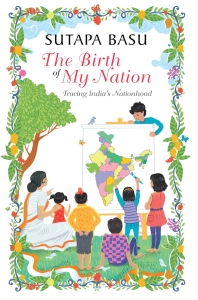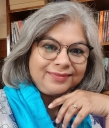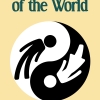
The Beginning
‘
Look! Who is that?’
Joy was pointing to the far bank of the river. Gulmohars flashed red blossoms, gnarled tamarind and shady mango trees dotted the grassy slopes.
The children crowded the parapet of the old bridge. They were twelve-year-old Ahana and Yusuf along with Rajni, Joy, and Veer who were few years younger. And the littlest of the group was Trisha, who stood on her toes to look over the mossy wall. Somewhat blinded by the bright sunlight, all eyes tried to follow Joy’s pointing finger. Sure enough, somebody was there. ‘Who is it?’ Trisha asked, excitedly jumping up and down.
Yusuf shaded his eyes with a hand and squinted. Rajni and Ahana did the same but none of them could make out who it was. The person sat under the wide canopy of a mango tree looking towards the gushing river. Only the back could be seen from the bridge, for the face was cradled between bent knees. Funnily, the back was bowed as if weighed down by a great load. An air of deep sadness seemed to surround the hunched figure.
Mystified, the children looked at each other.
‘And...and that is our mango tree,’ said Veer, pointing once more. The topknot bound in an orange kerchief bobbed anxiously on top of his head.
‘Yes, that’s our mango tree... ,’ agreed Yousuf, slowly. ‘But who is it?’
‘What about our green mangoes?’ asked Veer. ‘I was really looking forward to gorging on the ones fallen from the tree.’ ‘Can you stop thinking about food, Veer? We have enough picnic snacks with us,’ Ahana scolded.
‘C’mon. Let’s find out who it is,’ said Yusuf, striding forward. The others sprinted after him. Pudgy legs pumping, Veer tried to keep pace, but Trisha skipped ahead. The children went into the grove of trees stopping at a short distance from the enormous, old mango tree. As still as a rock, the figure kept gazing into the waters rippling a few feet below.
‘Can we help you?’ Ahana asked, her voice echoing in the hushed forest.
The person turned around to face them. It was a lady.
She was draped in a white sari edged with a broad orange border. The white and orange fanning out on the green grass reminded Ahana of something, but she could not call it to mind at that very moment. The children observed her face framed in curly wisps that had escaped from the knot of inky-black hair bound loosely at the nape. The broad forehead slid down to a straight nose. Her lips were soft and no wrinkles marked the smooth, dusky skin. But it was her eyes that caught their attention; large, limpid, and filled with deep, dark sorrow. However, the stranger looked calmly at them. She was neither startled nor annoyed by their sudden appearance. Almost, as if she was expecting them.
‘Can we help you?’ repeated Ahana, softly.
The children were surprised at how quickly the stranger’s expression changed at Ahana’s words. Misery vanished. Kindness and warmth lit up the fine eyes while the lips curved into a sweet smile. Lifting a hand, she beckoned.
The older children hesitated, but little Trisha bounded to her.
‘Hi!’ Trisha said, brightly.
‘I hope we have not disturbed you,’ Yusuf politely added, having come closer.
‘No, no. Of course not,’ replied the lady, shaking her head. Now that they were standing beside her, the children noticed a little sadness still lurking in her gentle eyes.
‘Actually,’ remarked Veer, ‘you are sitting under our mango tree.’ Ahana shot him a warning look, but he pointed at the green fruit hidden in the grass. ‘Those green mangoes have fallen from the tree.’
The lady chuckled. It was such a delightful sound that the children smiled. She looked upwards. ‘Oh yes! I am sitting under a mango tree. Is it your tree?’ she asked, stretching out a hand to Veer.
Veer instantly went to her. She pulled him down beside her and gestured to the others. They settled in a half circle on the grass facing her though Trisha snuggled up to her. The remarkable lady picked up a few green mangoes from the grass. ‘If the tree is yours, these mangoes are also yours.’ She offered them to Veer. ‘Do you want to keep them?’
Gleefully, Veer stuffed them in his pockets. The lady smiled at him and asked, ‘Who are you?’
‘We live in that colony on the other side of the river,’ explained Yusuf. Trisha pointed helpfully at the yellow towers peeping through the trees.
‘No, who are you, really?’ The lady asked, again.
The children stared at her, then looked at each other with puzzled faces.
‘Well,’ began Yusuf, slowly, ‘My name is Yusuf, and I am a Kashmiri.’
Taking his lead, Rajni declared, ‘My name is Rajni, and I am a Gujarati.’
‘And I am Trisha. I am from Telangana,’ pipped up Trisha.
‘I am a Manipuri, and my name is Joy,’ said Joy.
‘I am Ahana and a Bengali,’ said the eldest girl.
‘And you?’ The lady smiled down at Veer.
‘I am Veer. I am a Punjabi,’ said Veer, placing a dimpled hand on his chest.
Sadness, once again, darkened lady’s eyes. She scanned each face. Then she softly asked, ‘But who is an Indian?’
Now the children looked truly stumped. Yusuf declared,
‘All of us are Indians, ma’am.’
‘You did not say so when I asked who you are,’ retorted the lady.
‘But... ,’ began Ahana with a confused shake of her head, ‘why should we say that we are Indians? Everyone knows we are Indians. Don’t we live in India?’
‘Well,’ the lady explained, ‘you told me you are Kashmiri, Bengali, Punjabi, Gujarati or from Telangana.’
‘Yes,’ agreed Yusuf. ‘When we say which states we come from, it makes each of us unique.’
‘It gives each of us an identity,’ Ahana added.
‘It makes each of us different,’ said Joy. The rest of them nodded.
‘My dear children, let us find out what makes us similar before we look for the differences among us.’
As the children frowned, she said, ‘Whichever state we come from, all of them exist in India. Therefore, what is our first identity? That we are Indians. That is what makes us similar, makes us one.’
Her eyes went from face to face observing their thoughtful expressions.
‘I feel sad when I hear our people call themselves Kashmiri, Bengali. Punjabi, Gujarati, Manipuri or any other. They forget that all these states are parts of one nation, our India. Each state breathes because India lives.’
‘What do you mean by that?’ Veer looked baffled.
‘You see, Veer, India has existed for thousands of years, long before any state was born,’ she began to explain. ‘India has always existed even before history was written. But the states. . .? They were formed one by one. Did you know...,’ the lady looked down at Trisha, ‘that there was no Telangana until a few years ago?’
About the Author







Comments